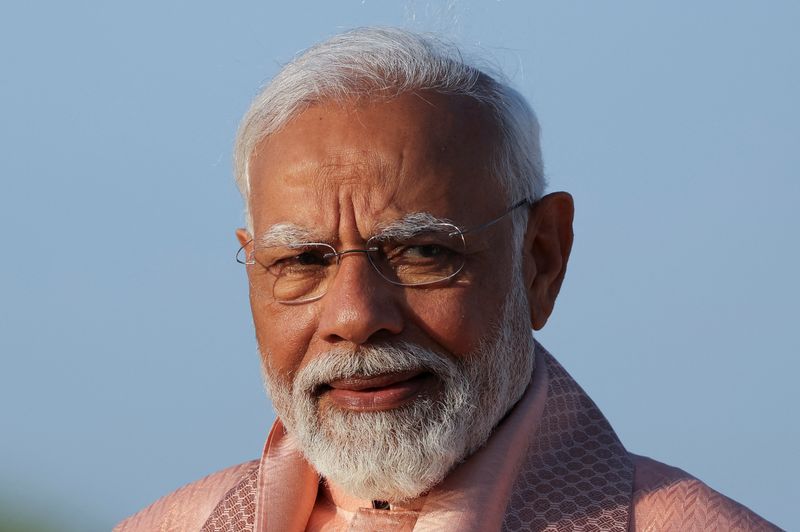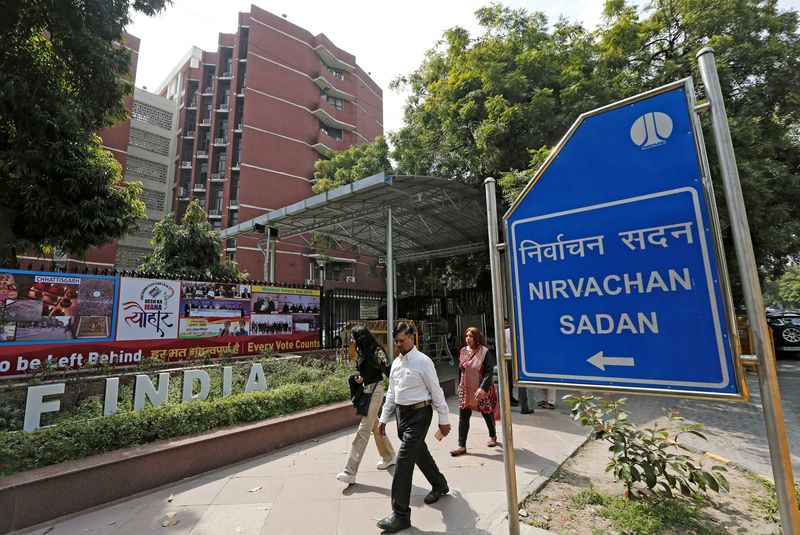By YP Rajesh
NEW DELHI (Reuters) -India will elect a new parliament in seven phases between April 19 and early June, the country's election authority said on Saturday, in what amounts to the world's largest election with nearly one billion eligible to vote.
The election pits two-term strongman Prime Minister Narendra Modi and his regional allies against a bickering alliance of two dozen opposition parties, with surveys suggesting a comfortable win for Modi's Hindu nationalist Bharatiya Janata party (BJP).
A victory would make Modi, 73, only the second prime minister after Jawaharlal Nehru, India's independence hero and its first prime minister, to win a third straight term.
"We address you at a precious moment, when we as a nation are set to reiterate our pledge to electoral democracy, when Indians will together express their will once again," Rajiv Kumar, the head of the independent Election Commission of India, told reporters.
The last of the seven phases of voting will be held on June 1 and votes counted on June 4, he said.
Modi said the "biggest festival of democracy" had started and his party would campaign on its track record of "good governance and public service".
"I have full confidence that we will get the full affection and blessings" of more than 960 million voters for the third consecutive time, he said in a series of posts on X.
Modi and his party have been in campaign mode for months. The prime minister has been flying around the country almost daily, inaugurating new projects, taking part in religious events and addressing public and private meetings.
In his speeches, Modi has been showcasing India's economic growth, with India becoming the fastest-growing major economy in the world at present, as well as investment in infrastructure and welfare programmes for the poor.
OPPOSITION ALLIANCE STRUGGLING
A main talking point has also been his party's agenda for Hindu reawakening, including the inauguration of a grand temple to Lord Ram on the site of a destroyed mosque.
Modi has set a target of 370 seats for BJP and 400-plus for the National Democratic Alliance (NDA) it heads in the 543-member lower house of parliament, up from the 303 the BJP won and more than the 350 the NDA won in 2019.
The 2019 performance was the best ever for the party which was formed in 1980.
Modi will be challenged by an alliance of some two-dozen opposition parties led by the main opposition Congress party called INDIA or the Indian National Developmental Inclusive Alliance.
The alliance formed last year has, however, been struggling to stay united and share seats amicably.
Congress, which has ruled India for 54 of its 76 years since independence from Britain, has sunk to record lows after Modi swept to power and is struggling to revive support.
The party is highlighting unemployment, rural distress, what it says is crony capitalism, the need for more affirmative action for the so-called backward castes and the need to end religious polarisation and hate in its pitch to defeat Modi.

"This will perhaps be the last chance to save democracy and our constitution from dictatorship," Congress president Mallikarjun Kharge posted on X. "We the people of India will together fight against hatred, loot, unemployment, price rise and atrocities."
Nearly 970 million people are registered to vote at over one million polling stations in the mammoth electoral exercise with 2,400 political parties likely to contest.
